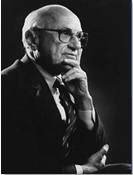Media
Would Milton Friedman Support the Fed’s “Stimulus VI”?
 In a recent Wall Street Journal op-ed, Allan Meltzer argues that Nobel laureate economist Milton Friedman would never have supported the Federal Reserve’s purchase of $600 billion in long term treasury bonds to boost the economy.
In a recent Wall Street Journal op-ed, Allan Meltzer argues that Nobel laureate economist Milton Friedman would never have supported the Federal Reserve’s purchase of $600 billion in long term treasury bonds to boost the economy.
Friedman believed in a stable growth monetary policy that was both predictable and constant. Unlike some free market economists today, Friedman did support having a Federal Reserve and actually urged them to increase monetary growth in times of deflation, or falling prices. Meltzer, however, completely destroys the myth of deflation as a current threat, showing that government inflation statistics are rising. In addition, the CPI (a measure of inflation) gives a large weighting to housing prices, which were in a bubble and needed to come down.
Friedman and Meltzer agree that printing money to boost the economy or pay off debt will obviously lead to higher inflation. “Curing unemployment by inflation” Friedman explains, “will actually lead to more unemployment later,” as the Fed will then have to cut back on the money supply to protect the dollar.
Americans can thus expect higher inflation and higher unemployment in years to come thanks to the Fed. Similar to the recent state pension bill, this action simply kicks the can further down the road and does nothing to address the fundamental problem that America has too much debt, too much government spending.
Milton Friedman, in other words, was not against the Federal Reserve establishing interest rates based on economic trends, but knew that government could not stimulate an economy.